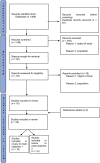Dyadic Experiences and Psychosocial Management of Couples Facing Advanced Cancer: A Systematic Review of the Literature
- PMID: 35756231
- PMCID: PMC9215330
- DOI: 10.3389/fpsyg.2022.827947
Dyadic Experiences and Psychosocial Management of Couples Facing Advanced Cancer: A Systematic Review of the Literature
Abstract
Background: Cancer diagnosis and treatment represent a real upheaval both for the patient and for his or her life partner. Adjustment to cancer has been widely studied at the individual level, however, there is little in the literature about the experiences of the couple as an entity. This is especially true with regard to a population facing advanced cancer. This systematic review aimed to make an inventory of 1) the current knowledge relating to the experience of the patient-partner dyad when confronted with advanced cancer, and 2) the psychosocial interventions specifically centered on this dyad.
Method: This review was conducted using the Cochrane methodology. The eligibility criteria for the literature review were: one of the members of the dyad being treated for advanced cancer, dyad composed of the patient and his/her life partner. Databases from PubMed, PsycArticle, PsycInfo, Psychology and Behavioral Sciences Collection and Scopus were investigated. A thematic content analysis on the basis of admitted articles made it possible to respond to each of our research objectives.
Results: Three hundred eighty-nine citations were found. Twenty were admitted to the systematic review of the literature. It highlighted the following experiences of the advanced cancer patient-life partner dyad: uncertainty about the future, disjointed time, intrusion into the couple's intimacy, attachment style and caregiving within the couple, couple's adjustment to cancer symptomatology, the couple's supportive care needs, role changes, nature of communication within the couple, anticipation of the coming death, and the meanings and beliefs around death. This review also describes the range of couple therapies used in the context of advanced cancer: emotionally focused-couple therapy, existential therapy, art therapy, support therapy and couple communication and intimacy promotion. These therapies seem to have individual beneficial effects for both the patient and his or her life partner as well as improving marital functioning.
Conclusions: These results clearly highlight that consideration of the couple and communication within the couple during care are fundamental to dyadic adjustment to advanced cancer. Further studies (qualitative and quantitative) are needed to better understand the couple's experience in order to adapt the management of the couple facing advanced cancer.
Keywords: advanced cancer; couple; couple therapy; couple's experience; end-of-life.
Copyright © 2022 Hasdenteufel and Quintard.
Conflict of interest statement
The authors declare that the research was conducted in the absence of any commercial or financial relationships that could be construed as a potential conflict of interest.
Figures
References
-
- Baider L., Kaufman B., Peretz T., Manor O. (1996). Mutuality of fate: Adaptation and psychological distress in cancer patients and their partners, in Cancer and the family (John Wiley & Sons: ).
-
- Bodenmann G. (1995). A systemic-transactional conceptualization of stress and coping in couples. Swiss J. Psychol. 54, 34–49.
Publication types
LinkOut - more resources
Full Text Sources


